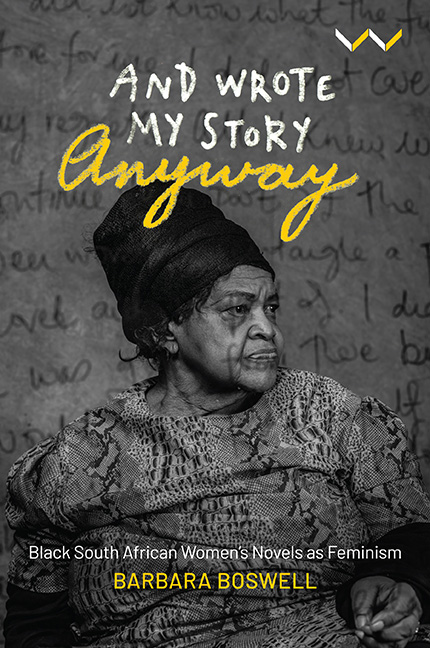Book contents
- Frontmatter
- Dedication
- Contents
- Acknowledgements
- Author's Preface
- Acronyms
- Introduction: ‘And Wrote My Story Anyway’: Black South African Women's Novels as Feminism
- 1 Writing as Activism: A History of Black South African Women's Writing
- 2 Rewriting the Apartheid Nation: Miriam Tlali and Lauretta Ngcobo
- 3 Dissenting Daughters: Girlhood and Nation in the Fiction of Farida Karodia and Agnes Sam
- 4 Interrogating ‘Truth’ in the Post-Apartheid Nation: Zoë Wicomb and Sindiwe Magona
- 5 Making Personhood: Remaking History in Yvette Christiansë and Rayda Jacobs's Neo-Slave Narratives
- 6 Black Women Writing ‘New’ South African Masculinities: Kagiso Lesego Molope and Zukiswa Wanner
- Conclusion: Towards a Black South African Feminist Criticism
- Select Bibliography
- Index
5 - Making Personhood: Remaking History in Yvette Christiansë and Rayda Jacobs's Neo-Slave Narratives
Published online by Cambridge University Press: 15 June 2021
- Frontmatter
- Dedication
- Contents
- Acknowledgements
- Author's Preface
- Acronyms
- Introduction: ‘And Wrote My Story Anyway’: Black South African Women's Novels as Feminism
- 1 Writing as Activism: A History of Black South African Women's Writing
- 2 Rewriting the Apartheid Nation: Miriam Tlali and Lauretta Ngcobo
- 3 Dissenting Daughters: Girlhood and Nation in the Fiction of Farida Karodia and Agnes Sam
- 4 Interrogating ‘Truth’ in the Post-Apartheid Nation: Zoë Wicomb and Sindiwe Magona
- 5 Making Personhood: Remaking History in Yvette Christiansë and Rayda Jacobs's Neo-Slave Narratives
- 6 Black Women Writing ‘New’ South African Masculinities: Kagiso Lesego Molope and Zukiswa Wanner
- Conclusion: Towards a Black South African Feminist Criticism
- Select Bibliography
- Index
Summary
She struggled for years to unlock those doors,
to find the stories buried underneath those floors.
There she went all dressed in shame,
from there she returned without a name.
At night she tried to scale those walls,
to get a glimpse of figures in the halls.
She lay in her bed stiff and petrified
while trying to unravel who the ones were that lied.
Until she climbed the polished steps
and entered a place of many maps.
She found her fingerprints on the open doors,
Her footsteps mirrored on wooden floors.
She stepped into the dungeon and unearthed herself,
ever probing and learning where to delve.
She traced herself to bygone days,
to show how she existed in many different ways.
Diana Ferrus — from ‘An Ode to the Slave Lodge’It is not possible to fully understand enduring concepts
of race, sexuality and belonging in the country today, I
argue, without attending to the crucible of colonialism,
slavery, and Islam in which they were formed.
Gabeba Baderoon — Regarding MuslimsThe neo-slave narrative is a relatively new literary form for black South African writers, especially for those traditionally excluded from circuits of publication by apartheid law. Originating in the United States, the form casts the practice of slavery from the perspective of the enslaved (Rushdy 1999), inviting the reader into a fictive world which not only portrays the horror of slavery, but also reimagines and recasts it through a lens of resistance. In this chapter, I examine how Yvette Christiansë's Unconfessed (2006) and Rayda Jacobs's The Slave Book (1998) – the first neo-slave narratives penned by black South African women – construct slavery at the Cape, in their transitional and post-transitional literature on the subject. While predecessors and contemporary companions to this genre have creatively imagined and explored the slave experience, notably André Brink, Trudie Bloem, Pamela Jooste and Claire Robertson, the novels of Christiansë and Jooste mark a turning point in the production of South African fiction about slavery: the slave experience was, for the first time, creatively imagined by black women who, quite likely, are descended from the enslaved peoples who built much of the infrastructure of early South African society.
Boswell (2016) has argued that contemporary post-transitional black South African women's poetry produces an ethic that seeks to restore both fragmented histories and fractured subjectivities that are the result of colonial and apartheid domination.
- Type
- Chapter
- Information
- And Wrote My Story AnywayBlack South African Women's Novels as Feminism, pp. 145 - 170Publisher: Wits University PressPrint publication year: 2021



